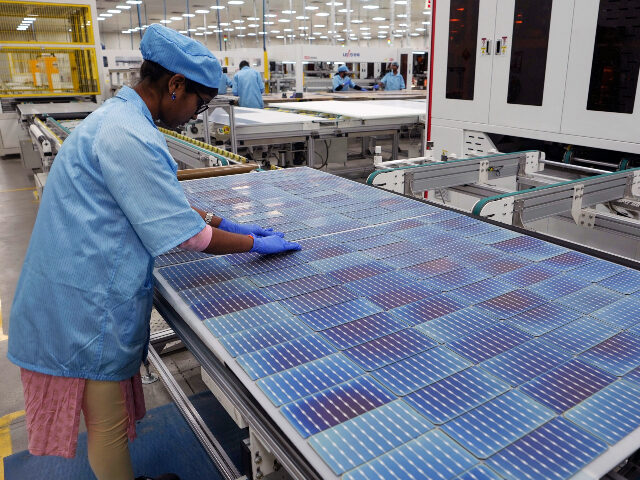Mining authorities in India announced on Thursday that they had discovered potentially as much as 5.9 million tonnes of lithium deposits in northern Jammu and Kashmir, a potential gamechanger in the race to dominate the electric vehicle battery industry.
Lithium is a critical metal in the manufacturing of batteries for electric vehicles – as well as mobile phones, computers, and other advanced technology. India currently counts on very minimal domestic mining of lithium but has in the past year attempted a dramatic expansion of its processing through deals with Argentina, one of the top sources of lithium in the world.
Currently, neighboring China dominates the lithium battery manufacturing industry, controlling about 60 percent of the world’s capacity for processing lithium into batteries. China has invested heavily in negotiations with major lithium producers such as Argentina, Chile, and allies in Africa in an attempt to fully dominate the green “transition” from fossil fuels such as oil and coal to mined minerals not considered “fossil fuels,” despite their similar origins, such as lithium.
India has shifted its foreign policy focus significantly towards competition with China since a 2020 battle on their mutual border, prompted by a Chinese invasion and concluding with double the number of Chinese deaths as Indian soldiers killed. The government of Hindu nationalist Prime Minister Narendra Modi has expanded competition with China outside of the military into economics, launching a “Make in India” campaign designed to entice global corporations into moving manufacturing out of China into India.

Indian Finance Minister Nirmala Sitharaman, in red, leaves her office for President’s house before presenting the federal budget for the financial year 2023-24 in the Parliament in New Delhi, India, Wednesday, Feb. 1 2023. (AP Photo/Manish Swarup)
The discovery in Jammu and Kashmir may lead to both intensified competition with China and increased violence in Kashmir, the largely Muslim disputed region alongside the border with Pakistan.
According to the Geological Survey of India (GSI), the major lithium deposit discovered is located in the Reasi district of Jammu, south of Kashmir and in a Hindu-populated area, typically not victim to the decades of violence in Kashmir. The alleged discovery is the first of its scale in India.
Indian Mines Secretary Vivek Bharadwaj announced the discovery as well at a meeting of the nation’s Central Geological Programming board meeting on Thursday, according to the Press Trust of India (PTI).
“Speaking at the 62nd Central Geological Programming board meeting here, Mr. Bharadwaj also said that whether it is a mobile phone or a solar panel, critical minerals are required everywhere,” PTI reported. “In order to become self-reliant, it is very important for the country to find out critical minerals and also process it, he said.”
Southeast Asia, particularly Afghanistan, is believed to be home to some of the world’s largest deposits of rare-earth minerals and key elements such as lithium, but governments and corporations have largely failed to exploit those resources as a result of decades of violence and instability. Illegal lithium mining has long been a lucrative industry in Afghanistan, however, first as a source of revenue for the rebel Taliban and now as a source of revenue for criminals attempting to avoid the ruling Taliban regime. Last month, Taliban terrorist officials announced the arrest of five men, two of them Chinese citizens, smuggling lithium out of Afghanistan into China, presumably for processing into battery components.
Jammu border Pakistan’s east, almost directly across from Pakistan’s western border with Afghanistan.
Pakistan and India dispute control over Kashmir, the sister region India co-administers with Kashmir. India has fought two wars over Kashmir, as China also claims sovereignty over Kashmir, but in recent years has largely abstained from challenging India in that region, sticking instead to disputes on the border between occupied Tibet and India regions Ladakh and Arunachal Pradesh. Violence initially soared in Kashmir in 2019 when Modi announced the end of a semi-autonomous policy for the regime and readministered the region, creating the union territory of Jammu and Kashmir. The past year saw a lull in regional violence as India refocused its efforts against China, but multiple episodes of shooting attacks and bombings in January have led to fears of renewed anti-Indian insurgency in the region.
Competition with China has invigorated Modi’s “Make in India” campaign, intended to sway companies out of manufacturing in China. China’s disastrous handling of the coronavirus pandemic, which resulted in weeks of rioting at the world’s largest iPhone manufacturing plant last year, preceded multiple agreements reported between Apple and New Delhi to shift iPhone production to sites in India. Foxconn, the Taiwanese supplier corporation in change of the riot-prone Zhengzhou iPhone plant, also announced a $500 million investment in projects in India in December, signaling a small but notable shift in global trends.
Indian officials also secured an agreement this month with the government of leftist American President Joe Biden to bring General Electric jet engine manufacturing to India, part of the two countries’ U.S.-India Initiative on Critical and Emerging Technologies (iCET). The General Electric deal was billed as the first in a series of similar projects meant to compete with Chinese dominance in technology.

COMMENTS
Please let us know if you're having issues with commenting.